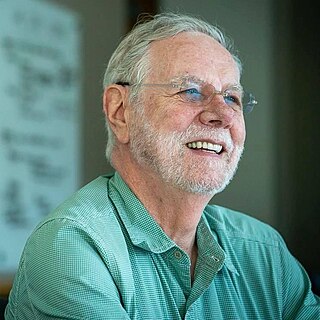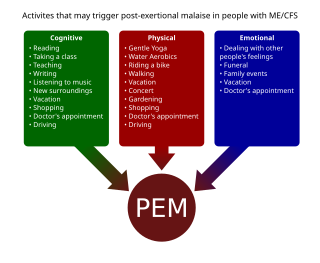Related Research Articles

The ME Association is a UK health charitable organization that provides information, advocacy, and services to persons and families affected by ME/CFS, and raises funds for research into ME/CFS. It has been reported to be one of the two largest UK charities for ME/CFS.

Myalgic encephalomyelitis/chronic fatigue syndrome (ME/CFS) has a long history with an evolution in medical understanding, diagnoses and social perceptions.
Management of ME/CFS focuses on symptoms management, as no treatments that address the root cause of the illness are available. Pacing, or regulating one's activities to avoid triggering worse symptoms, is the most common management strategy for post-exertional malaise. Clinical management varies widely, with many patients receiving combinations of therapies.

Myalgic encephalomyelitis/chronic fatigue syndrome (ME/CFS) is an illness with a history of controversy. Although it is classified as an organic disease by a majority of researchers, it was historically assumed to be psychosocial, an opinion still held among many physicians. The pathophysiology of ME/CFS remains unclear, there exist many competing diagnostic criteria, and some proposed treatments are controversial. There is a lack of education and accurate information about the condition among a significant number of medical practitioners, which has led to substantiated accusations of patient neglect and harm.

Clinical descriptions of ME/CFS vary. Different groups have produced sets of diagnostic criteria that share many similarities. The biggest differences between criteria are whether post-exertional malaise (PEM) is required, and the number of symptoms needed.
The Lightning Process (LP) is a three-day personal training programme developed and trademarked by British osteopath Phil Parker. It makes unsubstantiated claims to be beneficial for various conditions, including ME/CFS, depression and chronic pain.
Graded exercise therapy (GET) is a programme of physical activity that starts very slowly and gradually increases over time, intended as a treatment for myalgic encephalomyelitis/chronic fatigue syndrome (ME/CFS). Most public health bodies, including the CDC and NICE, consider it ineffective, and its safety is disputed. However, GET still enjoys support among a minority of clinicians and organizations.
David Sheffield Bell is an American physician who has done extensive research on the clinical aspects of myalgic encephalomyelitis/chronic fatigue syndrome (ME/CFS). He has also conducted evaluations and research in pediatric ME/CFS and written numerous articles about the condition.
Daniel Peterson is an American physician in private practice in the state of Nevada, and has been described as a "pioneer" in the treatment of Myalgic encephalomyelitis/chronic fatigue syndrome (ME/CFS). He graduated from the University of Rochester School of Medicine, Rochester, New York, in 1976 and was an intern and resident at the University of Utah Medical Center from 1976 to 1979. In 1979, he became a diplomate of the American Board of Internal Medicine. He is president of Sierra Internal Medicine of Incline Village, established in 1981.
Myalgic encephalomyelitis/chronic fatigue syndrome (ME/CFS) is a disabling chronic illness. People with ME/CFS experience profound fatigue that does not go away with rest, sleep issues, and problems with memory or concentration. Further common symptoms include dizziness, nausea and pain. The hallmark symptom is a worsening of the illness which starts hours to days after minor physical or mental activity. This "crash" can last from hours or days to several months.

Ronald Wayne "Ron" Davis is professor of biochemistry and genetics, and director of the Stanford Genome Technology Center at Stanford University. Davis is a researcher in biotechnology and molecular genetics, particularly active in human and yeast genomics and the development of new technologies in genomics, with over 64 biotechnology patents. In 2013, it was said of Davis that "A substantial number of the major genetic advances of the past 20 years can be traced back to Davis in some way." Since his son fell severely ill with myalgic encephalomyelitis/chronic fatigue syndrome Davis has focused his research efforts into the illness.

Unrest is a 2017 documentary film produced and directed by Jennifer Brea. The film tells the story of how Jennifer and her new husband faced an illness that struck Jennifer just before they married. Initially dismissed by doctors, she starts filming herself to document her illness and connects with others who are home- or bedbound with myalgic encephalomyelitis/chronic fatigue syndrome (ME).
Rosamund Vallings is a medical doctor, known as one of the leading authorities on Chronic Fatigue Syndrome (ME/CFS) in New Zealand.

Post-exertional malaise (PEM), sometimes referred to as post-exertional symptom exacerbation (PESE) or post-exertional neuroimmune exhaustion (PENE), is a worsening of symptoms that occurs after minimal exertion. It is the hallmark symptom of myalgic encephalomyelitis/chronic fatigue syndrome (ME/CFS) and common in long COVID and fibromyalgia. PEM is often severe enough to be disabling, and is triggered by ordinary activities that healthy people tolerate. Typically, it begins 12–48 hours after the activity that triggers it, and lasts for days, but this is highly variable and may persist much longer. Management of PEM is symptom-based, and patients are recommended to pace their activities to avoid triggering PEM.
International May 12th Awareness Day, also known as International ME/CFS Awareness Day is held every year to raise awareness of myalgic encephalomyelitis/chronic fatigue syndrome, fibromyalgia, multiple chemical sensitivity, Gulf War syndrome and other chronic immunological and neurological diseases (CIND).

DecodeME is an ongoing genome-wide association study searching for genetic risk factors for ME/CFS. With a planned recruitment of 25,000 patients, it is expected to be the largest such study to date. Recruitment closed on 15 November 2023 and results are expected in 2024.
The Open Medicine Foundation (OMF) is a US-based charity that funds research into the illnesses myalgic encephalomyelitis/chronic fatigue syndrome (ME/CFS), fibromyalgia, post-treatment Lyme disease syndrome, and long COVID.
Carmen Scheibenbogen is a German immunologist who is the acting director of the Institute for Medical Immunology of the Charité university hospital in Berlin. She specialises in hematology, oncology and immunology. She leads the Outpatient Clinic for Immunodeficiency and the Fatigue Centre at the Charité hospital. She is one of the few doctors specialised in myalgic encephalomyelitis/chronic fatigue syndrome (ME/CFS) in Germany, and also researches long COVID.
The PACE trial was a large and controversial trial which compared the effects of cognitive behavioural therapy (CBT), graded exercise therapy (GET), adaptive pacing therapy, and specialist medical care for people with myalgic encephalomyelitis/chronic fatigue syndrome (ME/CFS).
References
- ↑ "unrest". www.sundance.org. Archived from the original on June 29, 2017. Retrieved December 17, 2016.
- ↑ "U.S. Documentary Special Jury Award For Editing". January 29, 2017.
- ↑ "Tribeca Film Festival".
- ↑ "Jennifer Bréa, Omar Wasow - Weddings". The New York Times. September 2, 2012. ISSN 0362-4331 . Retrieved December 17, 2016.
- ↑ "The New Science Of Exhaustion". www.wbur.org. February 16, 2015. Retrieved December 17, 2016.
- ↑ "Chronic fatigue syndrome activists launch 'uprising' from their beds". Al Jazeera America Tonight. Retrieved December 17, 2016.
- ↑ "A New Name, and Wider Recognition, for Chronic Fatigue Syndrome". The New Yorker. February 27, 2015. Retrieved December 17, 2016.
- ↑ Romm, Cari. "A Biological Basis for Chronic-Fatigue Syndrome". The Atlantic. Retrieved December 17, 2016.
- ↑ "Felled by 'Devastating Disease Doctors Have Never Heard of'". ABC News. October 31, 2013. Retrieved December 17, 2016.
- ↑ "Interview: Jennifer Brea Talks About Obstacles, Adjustments, and Inspiration". ProHealth.com. Archived from the original on January 8, 2017. Retrieved December 17, 2016.
- ↑ "Felled by 'Devastating Disease Doctors Have Never Heard of'". ABC News. October 31, 2013. Retrieved December 17, 2016.
- ↑ "Chronic fatigue syndrome activists launch 'uprising' from their beds" . Retrieved December 17, 2016.
- ↑ Grater, Tom (August 25, 2017). "Sundance prize-winning doc 'Unrest' gets UK release". ScreenDaily. Retrieved January 17, 2018.
- ↑ Morfoot, Addie (June 22, 2017). "PBS' Independent Lens Announces Season 16 Slate (EXCLUSIVE)". Variety. Retrieved January 8, 2017.
- ↑ Pedersen, Erik (December 8, 2017). "Oscars: Documentary Feature Shortlist Cuts Field To 15". Deadline. Retrieved December 11, 2017.
- ↑ "The Root 100 – 2014". The Root. January 1, 2014. Retrieved January 18, 2017.
- ↑ Verrillo, Erica (March 5, 2018). "ProHealth Is Proud To Announce Its 2017 ME/CFS Patient Advocate Of The Year: Jennifer Brea". ProHealth. Archived from the original on March 12, 2018. Retrieved March 12, 2018.
- ↑ "Myalgic Encephalomyelitis / Chronic Fatigue Syndrome Protests Tuesday". National Pain Report. September 27, 2016. Retrieved December 17, 2016.
- ↑ "The Beachwood Reporter - Chicago Residents To Protest Lack Of Support For Those Suffering With Myalgic Encephalomyelitis/Chronic Fatigue Syndrome". www.beachwoodreporter.com. September 26, 2016. Archived from the original on January 19, 2017. Retrieved December 17, 2016.
- ↑ "Severe ME left me in a world of pain and darkness. 26 years on, why is it still so poorly understood?". openDemocracy. December 19, 2016. Archived from the original on January 14, 2017. Retrieved January 18, 2017.
- ↑ Pendergrast, Tricia; Brown, Abigail; Sunnquist, Madison; Jantke, Rachel; Newton, Julia L.; Strand, Elin Bolle; Jason, Leonard A. (December 1, 2016). "Housebound versus nonhousebound patients with myalgic encephalomyelitis and chronic fatigue syndrome". Chronic Illness. 12 (4): 292–307. doi:10.1177/1742395316644770. ISSN 1745-9206. PMC 5464362 . PMID 27127189.
- ↑ ""Protesters Demand Increased Funding or ME/CFS Research"". U.S. News & World Report.
- ↑ "The story and stigma of a baffling illness: Jen Brea speaks at TEDSummit". TED Blog. June 27, 2016. Retrieved December 17, 2016.
- ↑ ""Jennifer Brea: What happens when you have a disease doctors can't diagnose"".